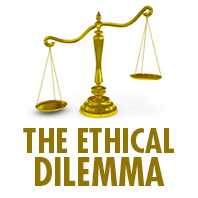The Ethical Dilemma: I’m an Ad Man Lying to the Public – What’s the Ethical Thing To Do?

Joan Reisman-Brill offers advice to an employee in an ad firm who needs the job, but doesn’t want the guilt.
Experiencing an ethical dilemma? Need advice from a humanist perspective?
Send your questions to The Ethical Dilemma at hnn@americanhumanist.org (subject line: Ethical Dilemma). All inquiries are kept confidential.
Ad Man with a Conscience: I have a very nice career as an advertising copywriter. It’s not my dream job, but it’s pretty interesting, fun, and it enables me to make a lot more money with my writing skills than I would almost any other way. My problem is that in the messages that I create for my job, I frequently have to bend the truth. If my client makes a particular product, I have to talk about why that product is better than the competition. Then if we switch accounts, I’ll be talking up what used to be the competition and trashing the product I was hyping previously. While none of this is outright lying, it can come very close and it’s certainly misleading. And it often results in getting people to buy things that they don’t need or that aren’t better than less expensive ones that don’t have big ad budgets. I feel guilty, but this is my job, and I’d rather not turn my back on it in this economy. What can I do?
—Selling and Selling Out
Dear Selling,
Welcome to the competitive, adversarial society we live in. You share a problem that affects many others, including lawyers who only present the facts (if they are facts) favorable to their clients, and politicians who often seem not to burden themselves with facts at all. At least you’re not totally lying (unless you’re lying about that). And if you don’t bend the truth to flatter your clients’ interests, they’ll find someone else who will.
There are a few things you can do to improve your situation short of looking for another career that might entail a vow of poverty. One is to work with a professional society in your field to articulate and promote ethical standards. Perhaps you could create educational programs both for your colleagues and for clients, and even for consumers (i.e., “How to tell when too good to be true isn’t true”) to uphold high standards and hold the fibbing to a minimum. Maybe in your spare time you could use your communications skills to express things you believe in, or spend some of your slightly filthy lucre supporting causes you care about.
In the meantime, bear in mind that you are a participant in an arena that has its own checks and balances. For every product you glorify, there must be people just like you glorifying the competitors. There are also consumer reporters and websites and blogs putting out information and reviews very likely questioning every questionable claim you make. The public is increasingly savvy about these resources and skeptical about who’s making what boasts. So do your best to keep your work fair and balanced, but think of your role as like that of debating teams whose task is to convince, regardless of which side of the argument they’re arguing.
Is Showering Required?: My husband’s cousin, age 50+, was raised by Jewish atheists. His first two weddings were to Jewish women, elaborate affairs complete with bridal showers. Recently he announced he was madly in love with a devout Catholic girl half his age, whom he was going to marry as soon as he got divorced from Wife #2. He says he will convert (to please the new wife, not because he found Jesus) and they’ll have lots of babies.
When his new love accompanied him to family functions (a Jewish wedding and two bar-mitzvahs), she was wearing enormous crosses. She asked the groom’s sister, who is very observant Jewish and good friends with Wife #2, to be her matron of honor in a church wedding. When the sister politely declined, the bride-to-be stopped speaking to her.
All the women in our Jewish/atheist family just got invited to her big fancy bridal shower. No one wants to go, especially the religious ones who oppose the intermarriage, but everyone except me (an atheist) says we have to go, and we have to give gifts. Do we?
—In a Lather about Shower
Dear Lather,
No, you all don’t have to go—and no one who’s going to be hostile should go. But if you are open to getting to know—and possibly like—the latest bride and her friends and family, this will be an opportunity to do so, as will the wedding. It’s possible that the bride will take it personally and be hurt if all of you don’t attend. But it’s also possible that she might have invited you just to be polite, or even under pressure from the groom, in which case she may actually be surprised or disappointed if all of you do show up.
If you (one or more—you don’t all have to do the same thing) decide to go, of course you must bring a gift. If you decline, however, it’s up to you whether to give any more presents to any more brides of this one relative. Just be sure to RSVP promptly, one way or the other. And no need to provide a reason if you opt not to attend—a simple checkmark next to “regrets” will do.
Did everyone catch the irony of this good Catholic girl engaged to a still-married man? Maybe she feels his marriages and divorces don’t count if they weren’t Catholic. And the big crosses may be her way to make sure no one mistakes her for Jewish at the Jewish functions. Please keep us posted if the groom actually does convert, makes lots of Catholic kids, and has finally found true love—or if he proceeds to #4.
